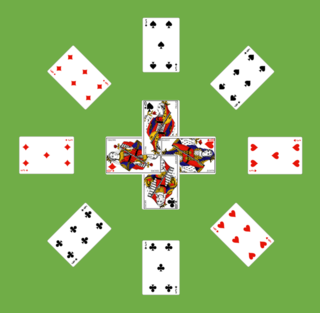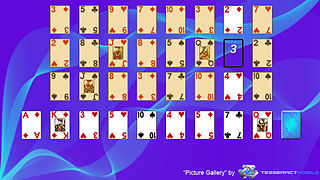Related Research Articles

Klondike, also known as Canfield, is a card game for one player and the best known and most popular version of the patience or solitaire family, something which "defies explanation" as it has one of the lowest rates of success of any such game. Partly because of that, it has spawned numerous variants including Batsford, Easthaven, King Albert, Thumb and Pouch, Somerset or Usk and Whitehead, as well as the American variants of the games, Agnes and Westcliff. The distinguishing feature of all variants is a triangular layout of the tableau, building in ascending sequence and packing in descending order.

Yukon is a type of patience or solitaire card game using a single deck of playing cards like Klondike, but there is no deck or stock, and manipulation of the tableau works differently.

Napoleon at St Helena is a 2-deck patience or solitaire card game for one player. It is quite difficult to win, and luck-of-the-draw is a significant factor. The Emperor Napoleon often played patience during his final exile to the island of St Helena, and this is said to be the version he probably played. Along with its variants, it is one of the most popular two-deck patiences or solitaires. The winning chances have been estimated as 1 in 10 games, with success typically dependent on the player's ability to clear one or more columns. The game is the progenitor of a large family of similar games, mostly with variations designed to make it easier to get out.
Canfield (US) or Demon (UK) is a patience or solitaire card game with a very low probability of winning. It is an English game first called Demon Patience and described as "the best game for one pack that has yet been invented". It was popularised in the United States in the early 20th century as a result of a story that casino owner Richard A. Canfield had turned it into a gambling game, although it may actually have been Klondike and not Demon that was played at his casino. As a result it became known as Canfield in the United States, while continuing to be called Demon Patience in the United Kingdom and elsewhere. It is closely related to Klondike, and is one of the most popular games of its type.

Agnes is a patience or solitaire card game that emerged in England about the same time as Klondike appeared in the US. The classic version has the unusual feature of packing in colour, a feature it shares with Whitehead. By contrast, the later American variant appears to have been influenced by Klondike with packing is in alternate colours. The classic game has been described as the best single-pack patience yet invented.

Quadrille is the name of two loosely related card games of the Patience or solitaire type which are often confused. Both use a pack of 52 playing cards. The earlier one was also known as La Française or Royal Quadrille, the slightly later one as Captive Queens. The name is derived from the desired outcome of the earlier game in which the four Kings and Queens are arranged in a square formation as in the European dance of quadrille that was fashionable in the 18th and 19th centuries.
Beleaguered Castle is a patience or solitaire card game played with a deck of 52 playing cards. It is sometimes described as "Freecell without cells" because its game play is somewhat akin to the popular solitaire computer game of that name but without extra empty spaces to maneuver. Beleaguered Castle is also called Laying Siege and Sham Battle.
British Square is a patience or solitaire card game which uses two decks of 52 playing cards each. It is a fan-type game in the style of La Belle Lucie. It has an unusual feature of switchback building whereby each foundation is first built up and then built down.
Crescent is a solitaire card game played with two decks of playing cards mixed together. The game is so called because when the cards are dealt properly, the resulting piles should form a large arc or a crescent. An alternative and less common name for the game is La Demi-Lune.
Tournament is a patience or solitaire card game which uses two decks of playing cards shuffled together. It is a variant of the much older game of Napoleon's Flank or Nivernaise and was first known as Maréchal Saxe.

Baroness is a patience or card solitaire that is played with a single deck of 52 playing cards. It is similar to other members of the Simple Addition family and is also distantly related to Aces Up.
Emperor is an English patience or solitaire card game which is played using two packs of playing cards. Although similar to other members of the large Napoleon at St Helena family, Emperor introduced the unique and distinguishing feature of worrying back as well as the novel term "sealed packet".
Napoleon's Square is a patience or solitaire card game which uses two decks of playing cards. First described in a revised edition of Lady Cadogan's Illustrated Games of Patience or Solitaire in the early 1900s, it is an easy variation of Napoleon at St Helena. It is not determined if Napoleon actually played this game, or any solitaire game named after him.
Deuces or Twos is a patience or card solitaire game of English origin which is played with two packs of playing cards. It is so called because each foundation starts with a Deuce, or Two. It belongs to a family of card games that includes Busy Aces, which is derived in turn from Napoleon at St Helena.
Amazons is an old patience or card solitaire game which is played with a single deck of playing cards. The game is played with a Piquet pack minus the kings or a standard 52-card pack that has its twos, threes, fours, fives, sixes, and kings removed. This game is named after the female-led tribe, the Amazons, because the queen is the highest card, and all queens are displayed if the game is won.
Duchess of Luynes is a patience or card solitaire game played with two packs of playing cards. It is a member of the Sir Tommy family. A unique feature of this game is the building of the reserve, which is not used until the entire stock runs out.

Four Seasons is a patience or card solitaire which is played with a single deck of playing cards. It is also known as Corner Card and Vanishing Cross, due to the arrangement of the foundations and the tableau respectively. Another alternate name is Cross Currents.

Fortune's Favor or Fortune's Favour is a patience or card solitaire which is played with a deck of 52 playing cards. It is so-called probably because the chances of winning are completely on the player's side. It is a significantly simplified version of the game Busy Aces, a member of the Forty Thieves family of solitaire games.
Algerian or Algerian Patience is a unique and difficult patience or card solitaire using two decks of playing cards. The object of the game is to build 8 foundations down from King to Ace or up from Ace to King in suit.

Royal Parade is an old, English, two-pack patience of the half-open builder type. The object of the game is to move cards to the foundations to create a 'gallery' full of picture cards.
